Last weekend we sheltered from the lashing rain under the Eden project’s enormous biomes. I had been drawn there by the current exhibition on bees. A set of three hives are placed in a prominent position up on a hill as you approach Eden – with a sign asking people to keep their distance!
The bee exhibition was a mix of paintings and sculptures by Kurt Jackson, plus a immersive interactive artwork by Wolfgang Buttress and magnified closeup photos of honey bee body parts.
The art work is gorgeous, as you can see. I would have liked to take more photos of Kurt Jackson’s atmospheric beekeeper paintings, but most of his work was behind glass, which makes for bad photos.
- Kurt Jackson’s art
Wolfgang Buttress is well known for his artwork ‘The Hive‘ at Kew Gardens. ‘Reverie’ is on a much smaller scale but I appreciated the scents of the bee friendly plants, accompanied by the sounds of the Eden colonies. A little seat was included in the middle so that you could sit and imagine yourself amongst the bees on a beautiful summer’s day (while outside torrential rain and gales battered Eden’s biomes).
- Wolfgang Buttress, Reverie
There was some information on the native dark honey bee as Cornwall is meant to be a stronghold of this subspecies. In 2019 the Eden Project is going to become the third dark honey bee reserve in the county (or Duchy as some locals prefer to call it!).
We spent an action packed day playing with Tommy – Eden has lots to do with small children. He was enchanted by the birds darting among the biomes. A few tantrums were also had, for instance he took against the many ants in the tropical biome and panicked when some got on him. He has also started disliking getting his shoes muddy. I try to encourage him to play outside and not worry about mud, so I hope he’ll grow out of it.
Eden had one final – but gigantic – bee for us as we left.
Bee update
Nature doesn’t slow down for long during a Cornish winter, so already we have multiple clusters of frogspawn jelly in our pond and vibrant yellow daffodils mixed in with snowdrops, primroses and crocuses.
I’ll probably remove my mouseguards and woodpecker protection in the last week of February/first week of March. The bees were still alive and inquisitively buzzing last time I checked on Saturday, busy high up in the brood boxes eating their fondant.
Swarm season always comes as a surprise to me. Although I’ve tried to be more prepared than usual by buying in the winter sales, no doubt all of a sudden frames will need to be made up and my new nucleus hives painted.
In the human world I’ve been helping my local association keep their website up-to-date and answering email enquiries. We’ve had a couple of enquiries recently from people looking to buy wax to make beeswax wraps and cosmetics. Beeswax wraps have really taken off and I can think of at least three different shops in Truro which are selling them now.
Also someone wanting honey from apiaries meeting ‘ethical’ specifications such as using no varroa treatments, no queen excluders, no feeding of sugar and completely unfiltered honey.
Sometimes people are looking to start businesses using local bee products but have quite strict limitations about what they require, and I do wonder if they’re likely to find chemical-free beekeepers (for example) who can supply honey or wax in large enough quantities. Anyway, it’s interesting hearing from members of the public and hopefully we can encourage new beekeepers or people wanting to help bees.



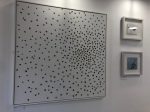



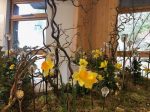
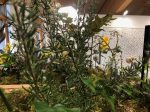
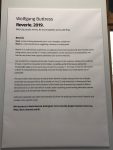

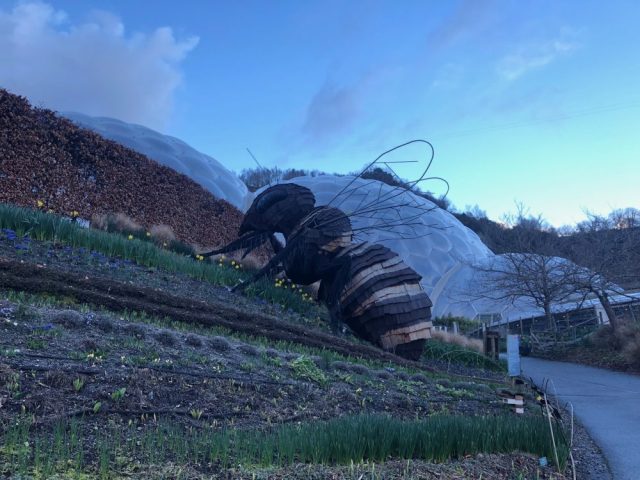


It’s none of my bee’s wax but that would make for one gigantic sting . . . if one had a gigantic bonnet.
OK, not my best effort. Nice post and good luck with your efforts.
LikeLike
He he. Yes much as I love bees I would rather that gigantic bee didn’t come to life.
LikeLiked by 1 person
I’d love to visit the Eden project! The painted hives look so beautiful. Here people make a huge issue about treating bees with organic treatments eg. thymol, oxalic or formic acid products (O.K.) and non-bio anything containing non-organic compounds (not O.K.). Perhaps this is the same for some people in the UK, they may just wish to have product from hives only receiving “natural” treatments. We treat using organic acid based treatments because they are the best for our bees, as far as we can ascertain. I have not heard about wax wraps unless it is for removing body hair. Amelia
LikeLiked by 1 person
Hi Amelia,
The people asking for honey/wax from chemical-free apiaries are not beekeepers so I assume they have no knowledge of the different treatments – or at least, if they do, they don’t mention it. I also use the ‘organic’ treatments, only oxalic acid and thymol (in the form of Apiguard), but I can’t claim to be chemical-free or treatment-free.
The wax wraps are used for covering food, as a reusable alternative to clingfilm. They usually sell for between £11-20 each and come in all sorts of different colourful patterns. Bees Abroad do nice looking ones: https://beesabroad.org.uk/shop/gifts/bee-wrap/ or there’s a tutorial for making your own here: http://myhealthygreenfamily.com/blog/wordpress/plastic-wrap-alternative-diy-beeswax-cotton-wraps/
LikeLiked by 2 people
You are such a mine of information! I am out of touch and thank you for the links. I expect I will try them as I have clean wax and I do not like waste. I try to use cloth napkins. It amazes me how quickly my generation has adopted the throw-away life. Your generation has more of an excuse.
LikeLike
Let us know you get on if you do make some. I’ve not got round to trying it myself. In Cornwall people of many ages seem quite eco-friendly in terms of things like reducing plastic waste, more so than in London. There’s a push to use paper straws and reusable coffee cups. I think it’s being near the sea. On the other hand people drive a lot here, unfortunately public transport is not great.
LikeLiked by 1 person
In this area ideas seem to infiltrate very slowly. There is virtually no public transport.
LikeLike
Hi Emily – I think you make a really good point about people wanting to source ethical beeswax (or indeed honey) as of course by its very nature, it is not mass produced. I work with another local businesswoman and she has all my beeswax for wraps but I only have a small amount because a honey harvest – and therefore beeswax – as we know, is actually extremely variable if you don’t feed sugar.
LikeLike
Yes, it’s awe inspiring how much effort it takes the bees to produce new wax. Members of the public may think it can be produced all round when, as we know, under natural circumstances actually the bees need the right weather conditions and a nectar flow to create new wax. It’s quite precious stuff!
LikeLiked by 1 person
The Eden project is on my to-do list! Interesting you mentioned bee products because friends of mine are asking about wax so they can make bee wraps…
LikeLike
Everyone is getting into the wraps! They come in so many pretty designs, not just bee themed but all sorts. I’ve seen lobsters and fish.
LikeLiked by 1 person
Sounds like a very interesting exhibition, we are going to see it in March, I have some photos of willd bees in Devon in the education centre but I havent seen them on display yet .
LikeLike
Hope you enjoy it in March Philip. The weather should be better by then so that you can enjoy the outside part without being blasted by wind and rain!
LikeLiked by 1 person
Looks to be an interesting exhibition with some great artwork – plus the bonus of the location. I was particularly interested in the info about Dark Honey Bees, did you mention some time ago you were interested in keeping them yourself? Funny how little ones take against things – perhaps get him an ant farm so he can watch them under glass? You’re garden is well in front of ours up here in North Wales, hope the coming storm doesn’t do too much damage.
LikeLike
I did put in an order for a nuc of dark bees, but the supplier was unable to sell them in the end as foul brood struck locally and there was a standstill put on the nearby apiaries. I caught a swarm and bought some mongrels from a local beekeeper instead, so the bees I have are local but not pure dark honey bees.
Tommy does usually like ants and other insects in our garden but perhaps the Eden ants scared him because there were so many! Good luck to you with the storm too, hope it passes quickly.
LikeLike
Pingback: Eden project bee exhibition – and a bee update | How To Start Bee Farming